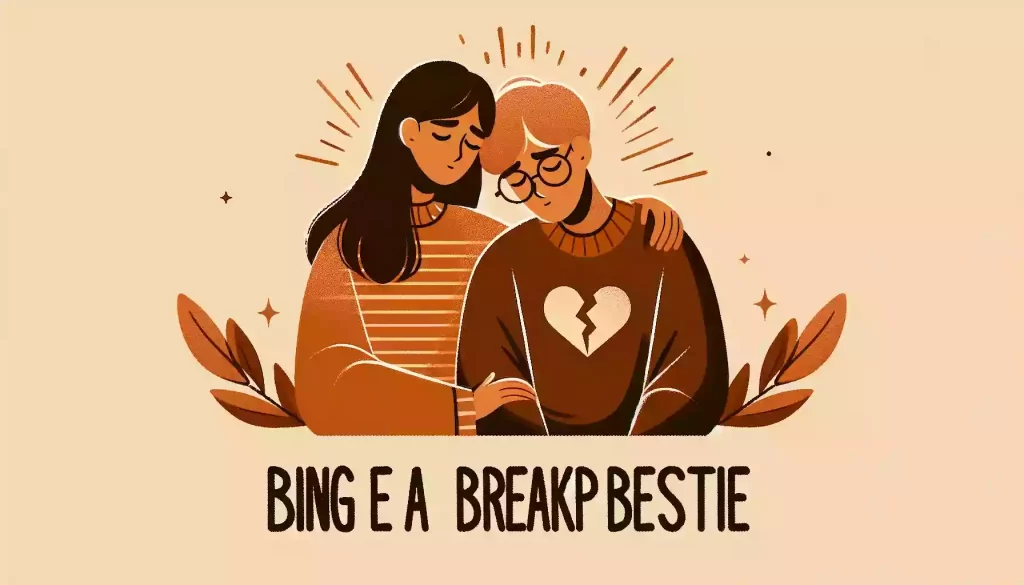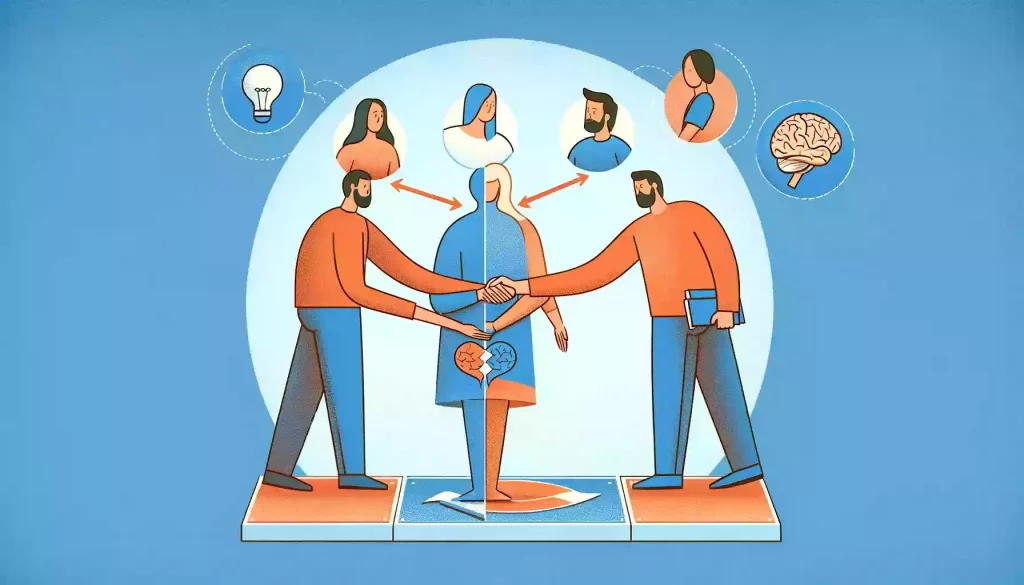Key Takeaways:
- Identifying the unique role and importance of a breakup bestie in emotional recovery.
- Strategies for managing emotions and social dynamics post-breakup.
- Practical tips for self-care and setting boundaries for personal growth.
- Guidance on moving forward and reentering the dating world post-breakup.
- Answers to frequently asked questions about navigating breakups with a bestie.
Understanding the Role of a Breakup Bestie
When faced with the tumult of a breakup, the role of a 'breakup bestie' becomes a beacon of support and understanding. This special friend is there not just to console, but to guide and provide a unique perspective outside of the emotional whirlwind. They stand as a confidant, a shoulder to cry on, and often, a voice of reason during moments of confusion and heartache.
A breakup bestie is more than just a friend; they are an emotional anchor. They help in sifting through the tangled web of feelings, offering support without judgment. Their role is not to provide solutions, but to listen, validate feelings, and sometimes, offer gentle guidance.
One key aspect of a breakup bestie's role is their ability to help maintain perspective. In the thick of heartache, it's easy to lose sight of the bigger picture. A breakup bestie helps in remembering personal worth and the promise of a future beyond the current pain.
Another crucial function is providing distraction when needed. Whether it's a night out or a quiet evening in, they know when to step in and help shift focus from the pain of the breakup to the joys still present in life.
It's also important to acknowledge the emotional toll this role can take. A breakup bestie often has to balance their own feelings while being a strong support system, a challenging but rewarding endeavor.
Additionally, a breakup bestie can help in identifying unhealthy patterns in the relationship that led to the breakup. This insight is invaluable in the healing process and in avoiding similar situations in the future.
Finally, a breakup bestie is often a pillar of hope. They remind the heartbroken that love and happiness are still attainable, offering a light at the end of the tunnel during what can be one of the darkest times in someone's life.
The Emotional Journey Post-Breakup
The emotional journey following a breakup is a complex and deeply personal experience. It often starts with a profound sense of loss and emptiness, as if a vital part of one's life has suddenly been removed.
As time progresses, these feelings can morph into a mix of anger, confusion, and longing. Questions of 'what if' and 'why' can dominate thoughts, making it difficult to focus on the present and future.
Gradually, there is a shift towards acceptance and understanding. This phase involves recognizing the breakup as a part of life's journey, an experience that, while painful, brings growth and self-awareness.
Resilience begins to build during this period. The once overwhelming emotions start to lose their grip, allowing for moments of happiness and peace to seep back in.
Ultimately, the journey leads to a newfound sense of self and, often, a clearer understanding of what one wants and needs in a relationship. It's a path marked by ups and downs, but one that eventually leads to healing and personal growth.
When to Seek a Breakup Bestie

Recognizing when to seek the support of a breakup bestie is a crucial step in the healing process. It often begins at the moment of realization that handling the emotional aftermath alone is overwhelming. This is typically a time filled with confusion, sadness, and a sense of loss, where the comfort of a trusted friend can be invaluable.
It's important to reach out when feelings of isolation become prominent. Breakups can create a void, and having someone to talk to can significantly ease the sense of loneliness.
Another key moment is when emotions become too intense or difficult to manage. Feelings of anger, betrayal, or profound sadness are signals that it's time to seek a breakup bestie's support. They can provide a safe space to express these emotions without judgment.
Seeking a breakup bestie is also advisable when there's a need for a reality check. In the midst of a breakup, it's easy to lose perspective, and a breakup bestie can offer an objective viewpoint that helps in seeing things more clearly.
When struggling with decisions about the future or how to navigate post-breakup life, a breakup bestie can provide guidance and advice based on their understanding of your personality and needs.
Lastly, it's time to turn to a breakup bestie when there's a desire to move on but uncertainty about how to begin. They can be a source of motivation and inspiration, helping to set goals and encouraging steps towards a new chapter in life.
Qualities of an Ideal Breakup Bestie
The ideal breakup bestie embodies a range of qualities that make them a vital support system during a breakup. Foremost among these is empathy – the ability to understand and share the feelings of another. This quality allows them to connect on a deep level and offer genuine comfort.
Non-judgmental support is another crucial trait. They offer a safe space where feelings can be expressed freely without fear of criticism or unwanted advice.
Good listening skills are essential. An ideal breakup bestie listens more than they speak, understanding that sometimes, all that's needed is a willing ear.
They also possess the ability to offer gentle guidance without pushing their own agenda. Their advice comes from a place of wanting the best for their friend, not from a desire to control the situation.
Last but not least, a sense of humor can be a lifeline. A breakup bestie who can lighten the mood at the right moment can make a world of difference in coping with the emotional rollercoaster of a breakup.
How to Be a Great Breakup Bestie

Being a great breakup bestie is about providing support, understanding, and sometimes, a dose of tough love. The first step is to be present; simply being there can mean the world to someone going through a breakup. It's about listening, offering a shoulder to cry on, and being available when needed.
Offering empathetic support is key. It involves understanding their feelings without necessarily trying to 'fix' the situation. Sometimes, the best support is just acknowledging their pain and affirming their right to feel it.
Providing perspective is another important role. When emotions run high, a breakup bestie can help maintain a sense of balance, reminding them of their strengths and the potential for a brighter future.
However, it's also essential to know when to encourage them to seek professional help. If their emotional state is deteriorating or they're struggling to cope, a good breakup bestie should suggest considering therapy or counseling.
Lastly, bringing joy and distraction can be just as important as offering a listening ear. Whether it's planning a fun day out or just sitting together watching a favorite show, these moments of lightness are crucial in the healing process.
Navigating Social Media Post-Breakup
Navigating social media post-breakup can be a minefield of emotions. The first step is often to take a break or limit exposure. Constant updates about an ex-partner can impede the healing process.
It's also important to resist the urge to check up on an ex. Obsessively looking at their social media profiles can lead to unnecessary pain and prolong the healing process.
Consider unfollowing or muting an ex or mutual friends if their posts trigger negative emotions. It's about creating a social media environment that promotes healing, not one that keeps old wounds open.
Be mindful of what is shared on social media. Avoid posting details about the breakup or negative feelings towards an ex, as it can lead to more drama and emotional turmoil.
Using social media as a means of support, by joining groups or following pages focused on healing and self-improvement, can be beneficial. It helps to see that others are going through similar experiences and thriving.
When feeling more emotionally stable, gradually reintroducing social media can be done with a new perspective, focusing on positive interactions and content that uplifts.
Finally, remember that social media is a curated version of reality. It's crucial not to compare one's healing process to the seemingly perfect lives displayed online.
Dealing with Mutual Friends

Dealing with mutual friends post-breakup requires tact and sensitivity. The first step is to avoid putting friends in a position where they feel they must choose sides. It's important to respect their relationships with both parties.
Open communication can be helpful. Letting friends know that you value their friendship and do not expect them to sever ties with your ex can ease potential tension.
Setting boundaries is crucial. If certain topics or situations are uncomfortable, it's okay to express this to mutual friends. They can only respect your boundaries if they are aware of them.
Plan social interactions thoughtfully. If attending the same event as your ex, consider strategies for handling any interactions in advance. This might include having a trusted friend by your side for support.
Lastly, it's important to recognize that some friendships may change or fade away. This is a natural part of life and not necessarily a reflection of anyone's fault or failure.
Self-Care Tips During a Breakup
Self-care is crucial during the emotional upheaval of a breakup. The first and most important step is to allow yourself to grieve. Accepting and expressing your emotions is vital for healing.
Maintaining a routine can provide a sense of stability. Try to stick to regular sleep patterns, eating habits, and exercise, as these can greatly affect your mood and energy levels.
Engaging in activities that bring joy and relaxation is another key aspect of self-care. Whether it's a hobby, spending time in nature, or simply watching a favorite movie, these activities can provide a much-needed respite.
Stay connected with supportive friends and family. Isolation can exacerbate feelings of sadness, so it's important to reach out and stay connected with your support network.
Lastly, consider seeking professional help if you're struggling to cope. Therapy can provide a safe space to explore your emotions and develop strategies for moving forward.
Setting Boundaries with Your Ex
Setting boundaries with an ex is a critical step in the healing process. The first boundary to consider is communication. Decide whether keeping in contact is healthy or if a complete break is necessary. This might include limiting or ceasing text messages, calls, and social media interactions.
Another important boundary is regarding personal space. This includes physical spaces like your home or workplace and digital spaces like social media. It's crucial to create an environment that feels safe and free from unwanted intrusions.
Discussing mutual friends and how to handle social gatherings can also be necessary. It's okay to request that friends refrain from sharing information about your ex, or to plan for how to handle potentially awkward situations at social events.
Financial or logistical ties, such as shared accounts or possessions, should be addressed. It’s essential to disentangle these aspects of your lives in a fair and respectful manner.
Lastly, it’s important to respect the boundaries your ex sets. This mutual respect will aid in the healing process for both parties.
Moving On: Finding Closure
Finding closure after a breakup is a deeply personal journey. It often begins with accepting the end of the relationship. This acceptance is not about agreeing with the breakup, but acknowledging that it has occurred and that a new chapter is beginning.
Reflecting on the relationship can be helpful. Understanding what went wrong and recognizing the lessons learned can provide valuable insights for future relationships.
Focusing on personal growth is another key aspect of finding closure. This might involve pursuing new interests, setting goals, or working on self-improvement.
Creating new memories is also important. Engaging in new experiences, meeting new people, and exploring new places can help to shift focus from the past to the present and future.
Lastly, patience is crucial. Healing from a breakup takes time, and it’s important to allow yourself to move through the process at your own pace.
Recommended Resources
- It's Called a Breakup Because It's Broken by Greg Behrendt and Amiira Ruotola, Broadway Books, 2005
- Getting Past Your Breakup by Susan J. Elliott, Da Capo Lifelong Books, 2009
- The Breakup Bible by Rachel Sussman, Three Rivers Press, 2007




Recommended Comments
There are no comments to display.
Create an account or sign in to comment
You need to be a member in order to leave a comment
Create an account
Sign up for a new account in our community. It's easy!
Register a new accountSign in
Already have an account? Sign in here.
Sign In Now